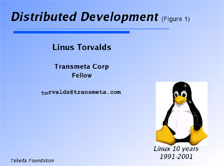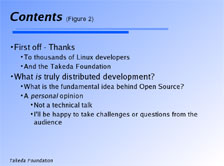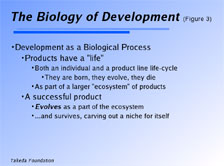
| Linus Torvalds |
 |
|
 |
 |
 |
|

figure 1

figure 2

figure 3 |
Figure 1
We have an interesting mix of award winners. Richard Stallman has
sometimes called me an "engineer" and I, in turn, will call him
a "visionary" and will call Dr. Sakamura "the academic". When Richard
Stallman called me an "engineer" he does it with respect but also,
at the same time, with the notion that I don't care so much about
the vision as about the work I do, which is true. You will find
that I agree with a lot of the ideals that Richard has but, at the
same time, I'm very proud of the fact that this small machine made
here in Japan not only runs Linux, an open source operating system,
but also runs a lot of open source programs. In fact, all the programs
running on it are basically open source. The program I use to show
this presentation is called Key Presenter and is completely open
source.
But, at the same time, another piece of this software on the computer
is the software that I was also helping write and design that actually
runs on the CPU itself, and that makes the CPU run, and that is
not open source. So, I'm here trying to encourage open source because
I think it's fun. It's fun, it's interesting and it's extremely
efficient to create good technical products. At the same time, I'm
not here as the visionary.
Figure 2
I want to tell you a bit about how development happens. Most of
the time I give technical talks, although during the last few years
that has become rarer. A technical talk for this audience is out
of place, so I instead want to explain how I think of development
and why I think that the open approach is so important and such
a good idea. I always try to start off my talks with a big THANK
YOU, this time obviously a big THANK YOU goes to the Takeda Foundation
for this honor. I also always want to make people realize just how
many people have been involved in the Linux community, both before
I joined in the form of open source free programs from the GNU project
but also in just the one project that I'm most well known for, the
kernel itself. I started it in 1991, and when I released the first
version it was 10,000 lines of code. Today, 10 years later, it's
on the order of 30 million lines of code, and I did not write most
of those lines. So, a big THANK YOU to a lot of the people involved.
As to the rest of the talk, I want to talk about what I call "Distributed
Development". This is my view of how I do development. It's a fairly
personal view. I'm not claiming that it's the right view. In fact,
I don't like doing talks very much. I'll be really happy about the
questions after the talk, and if the questions are somewhat argumentative,
that's okay by me.
Figure 3
I want to show one view of why open source is so nice. The view
I have as an engineer, as a developer, is that development is not
really the classic notion of design, implementation and marketing.
That is not how development really happens, at least not in any
of the projects I've been involved with.
Development is much more a biological process where the whole product
has a life. The product usually starts out as a small entity that
gets a few users. Over its lifetime, thanks to user feedback, thanks
to the work developers put into it, it evolves, and it evolves not
alone but as a part of the larger system of other products, whether
they are software or hardware. In that sense, it's very much like
life in an ecosystem.
|
|
|